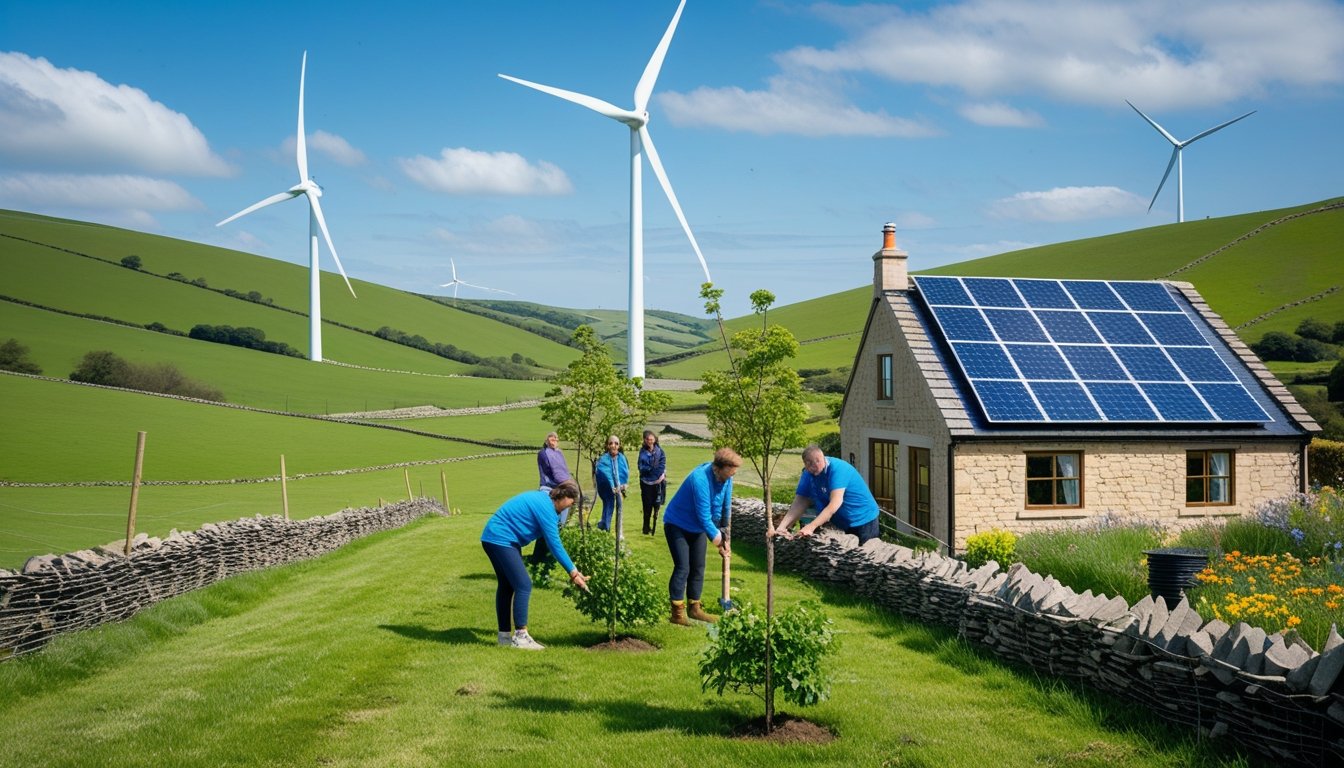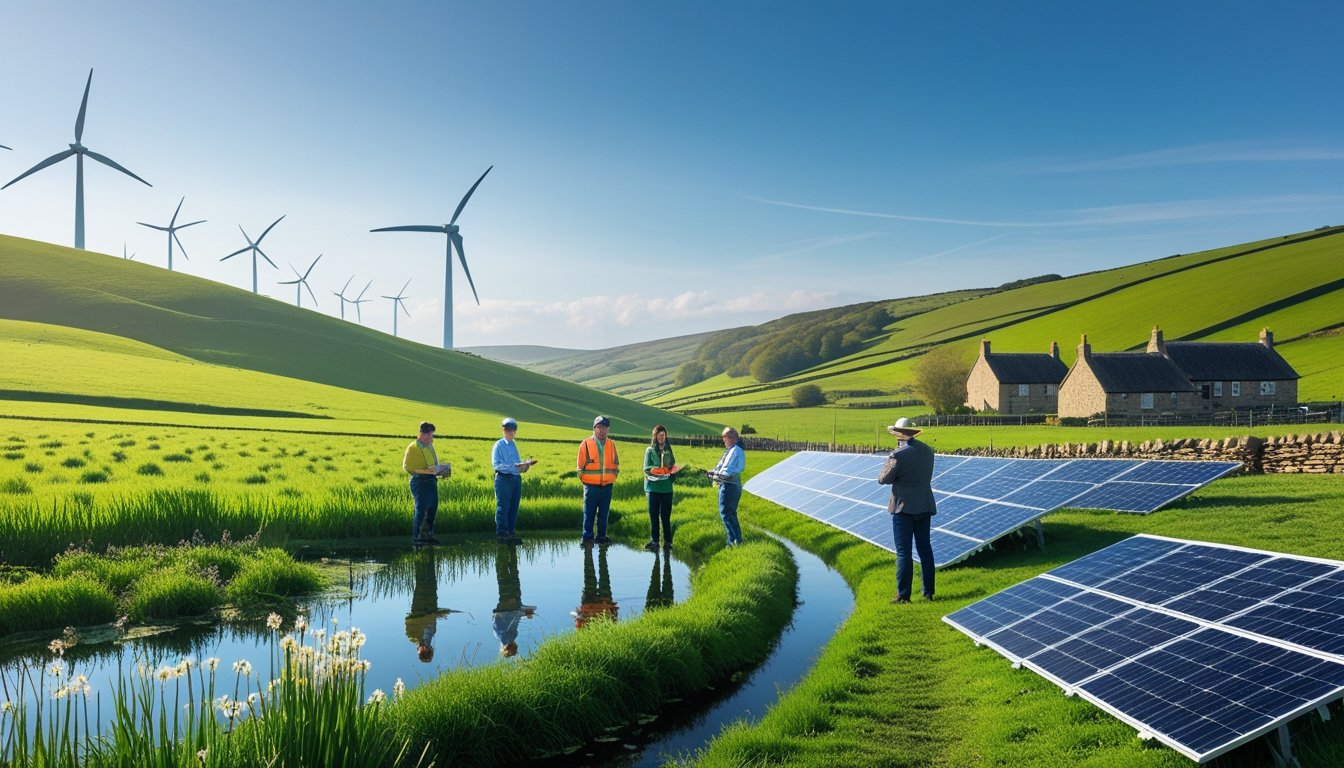Late updated: 05 Jun 2025 10:06
Written by: Oliver Bennett
Innovative Green Initiatives in UK's Countryside: Transforming Rural Sustainability
The UK's countryside is witnessing a transformation, fuelled by innovative green initiatives that harmonise environmental conservation and economic growth. From rewilding projects to sustainable land management, these efforts are designed to restore natural habitats and address climate change. Pioneering initiatives like environmental land management (ELM) not only support biodiversity but also integrate eco-friendly practices that benefit local communities and ecosystems.

Our journey through the UK's countryside reveals an exciting landscape of cutting-edge projects that are setting new standards for sustainable development. These initiatives focus on harnessing the potential of nature market strategies, including carbon sequestration and flood management. By blending modern techniques with age-old wisdom, these projects ensure the protection and enhancement of our natural resources.
As we explore these green innovations, we see an inspiring commitment to prioritising sustainable development. Through government support and community-led efforts, the UK is taking strides to make its countryside both economically viable and ecologically thriving.
Key Takeaways
- UK's countryside is being revitalised by innovative green initiatives.
- Nature market strategies play a crucial role in ecosystem restoration.
- Government and communities drive sustainable development efforts.
Modern Green Initiatives Shaping the UK Countryside
We explore how sustainable agriculture, renewable energy adoption, and conservation initiatives are transforming the UK's countryside. These efforts focus on reducing greenhouse gas emissions, enhancing energy security, and preserving biodiversity.
Sustainable Agriculture and Food Production
Sustainable agriculture has become a cornerstone of the UK's green initiatives. Agricultural practices are being revamped to include crop rotation, organic farming, and reduced pesticide use. These methods aim to minimize environmental impact while ensuring high yield and quality in food production.
Innovations in technology also play a significant role. Monitoring systems and precision agriculture techniques help us manage resources efficiently. The Environmental Land Management Scheme (ELMS) supports farmers by providing incentives to protect the environment and promote biodiversity. This scheme ensures that agricultural land remains productive, resilient, and climate-friendly.
Adoption of Renewable Energy and Energy Security
The shift to renewable energy sources, such as wind and solar power, is crucial in ensuring energy security across rural areas. Many farms and rural communities are installing wind turbines and solar panels, contributing to the production of renewable electricity. This shift reduces the reliance on fossil fuels and helps decrease greenhouse gas emissions.
Rural UK areas are benefiting from energy diversification, increasing resilience against extreme weather and fluctuating energy prices. By adopting renewable energy, we are paving the way towards a sustainable and self-reliant countryside.
Conservation of Biodiversity and Natural Resources
Biodiversity conservation is essential in maintaining a balanced ecosystem. In the UK countryside, several initiatives are working towards protecting natural habitats and enhancing ecosystem services. We prioritise projects that restore native vegetation, protect endangered species, and sustain wildlife corridors.
The use of conservation grazing and rewilding practices helps manage land effectively. These approaches not only preserve natural resources but also mitigate climate change impacts. By fostering biodiversity, our efforts ensure that rural communities thrive within a healthy environment.
Driving Innovation and Sustainable Development

In the UK's countryside, the integration of innovative green initiatives is pivotal for sustainable development. This involves leveraging technology, fostering community engagement, and implementing effective policies.
Role of Business, Technology, and Investment
Businesses are key drivers of innovation in the countryside. By investing in renewable energy projects and sustainable practices, they address environmental challenges while boosting economic growth. Technologies such as precision agriculture and data analytics empower farmers to increase productivity efficiently. Additionally, investment in green finance supports entrepreneurship and research, creating a robust ecosystem. Collaborations between businesses and technology sectors lead to the development of innovative solutions, ensuring that rural businesses remain competitive and sustainable.
Education, Skills, and Community Engagement
Education and skills development are fundamental in promoting innovative practices. By integrating green topics into educational curricula, we nurture a generation capable of addressing environmental issues. Community engagement ensures local stakeholders are actively participating in decision-making processes. Skills training, workshops, and events introduce farmers to new agricultural techniques and sustainable practices. This collaborative approach helps foster a culture of sustainability within rural areas, encouraging the adoption of green initiatives that are community-led and locally relevant.
Policy, Funding, and Governance for Green Initiatives
Government policies play a crucial role in shaping sustainable development. Through tax incentives and subsidies, authorities encourage the adoption of green technologies in agriculture and other rural industries. Organisations like UK Research and Innovation, alongside the National Farmers Union, provide essential support and advocacy for environmental policies. Efficient governance ensures the effective use of public funds to bolster green projects, promoting accountability and transparency. By aligning policies with local needs, we can ensure the resilience and growth of rural economies while advancing sustainability goals.
Frequently Asked Questions

In the UK, innovative green initiatives are reshaping the countryside. Efforts range from sustainable tourism to eco-friendly urban practices and accommodations, crafted to preserve the natural environment.
How is sustainable tourism being promoted in the British countryside?
Sustainable tourism in the countryside prioritises local culture and environment. We work toward minimising resource use and fostering local communities. We strive to encourage tourists to appreciate natural beauty while reducing their environmental impact through activities and infrastructure that support eco-friendly practices.
What steps are being taken to provide sustainable accommodation in rural UK areas?
Sustainable accommodations integrate renewable energy and eco-friendly materials. The drive to reduce carbon footprints includes building with recycled resources and installing solar panels. Our efforts are focused on promoting the use of local produce and conserving water through rainwater harvesting systems.
Which cities in the UK are leading in eco-friendly practices?
Several UK cities are excelling with eco-friendly initiatives. London leads with robust public transport options and green spaces. Edinburgh highlights its renewable energy projects. These cities are recognised for pioneering innovative solutions that enhance urban sustainability and reduce environmental impact.
Can you list eco-friendly hotels or accommodation in the UK?
An array of eco-friendly hotels and hostels span the UK. Examples include The Green House in Bournemouth, renowned for its sustainable practices. Many offer organic local produce, electric vehicle charging stations, and use biodegradable toiletries, reflecting our commitment to reducing carbon footprints in hospitality.
What eco-innovations are present in UK's countryside for preserving the environment?
Innovations such as agroforestry and conservation agriculture help preserve the countryside. We adapt traditional farming practices to modern techniques that enhance biodiversity and reduce soil erosion. Renewable energy initiatives like wind farms and solar panels also contribute to environmental preservation in rural settings.
How does the UK's environmental strategy address countryside sustainability?
The UK’s environmental strategy targets enhancing countryside resilience. Policies strengthen nature conservation, maintaining ecological balance using rewilding projects. Our approach integrates conservation with economic growth, ensuring long-term sustainability of rural areas for future generations. The strategy supports maintaining biodiversity and fostering local involvement in environmental projects.
